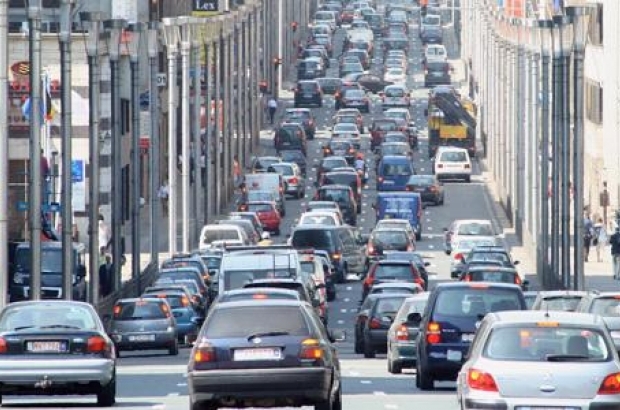- Daily & Weekly newsletters
- Buy & download The Bulletin
- Comment on our articles
First sensors begin recording Brussels noise pollution
In an effort to tackle the issue of traffic-related noise pollution, the Brussels region has launched a pilot project to measure noise levels throughout the city.
Noise pollution from car traffic is a public health problem and annoyance, causing issues from hearing problems and cardiovascular diseases to migraines and insomnia.
In terms of the health effects of long-term exposure to noise pollution, Brussels residents can expect to lose an average of eight months from their life expectancy.
An estimated 70% of the capital’s population is exposed to noise levels higher than those recommended by the World Health Organisation for road traffic, according to a study by ULB's School of Public Health.
The pilot project from Brussels Environment will test two different devices for measuring noise pollution over a month-long period.
One of the instruments was installed on Avenue Louis Bertrand earlier this week, near Josaphat Park in Schaerbeek. It was manufactured by MicroDB, a French company specialising in the field of sound measurement.
The second instrument will be installed on a busy regional thoroughfare this summer, and if the devices and results prove reliable, more noise detectors may be added.
“This device is similar to a classic radar, except that it measures sound instead of speed,” explained Catherine Lecointre, a noise expert for Brussels Environment.
“It has several microphones and cameras that scan vehicles' number plates and measure their speed. Thanks to a collaboration with the Vehicle Registration Service, Brussels Environment will thus have a noise level linked to a number plate and the technical characteristics of the vehicle. All this data, systematically anonymised, will then be analysed.”
“Several” microphones means 58, in the case of the first device. The idea is to get a clearer picture of just how bad the situation is when it comes to noise pollution in the congested Belgian capital.
“We are taking measures to ensure a healthy environment for the people of Brussels,” said Brussels health minister Alain Maron.
“We have a priority to act in favour of better health. There is an accepted level of noise that comes with living in a city. But there is noise that can be described as excessive and there is noise pollution.”
An estimated 20% of all Europeans are affected by noise pollution, which puts Brussels (70% of residents affected) on the higher end of the spectrum.
The installation and rental of the two devices intended to provide a better picture of the issue come at the cost of about €60,000.
Maron also added that a decree would be issued to regulate the noise of sirens, which, according to a Brussels study, is one of the top three biggest noise nuisances along with construction and traffic.
Catherine Bouland, president of the ULB School of Public Health and professor of environmental health, draws a distinction between sound and noise.
“[Noise] includes all sounds that we find unpleasant and that could have an effect on our health – among the sources in the city, outside, we have road traffic, but also rail traffic, planes flying over houses, and so on,” Bouland said.
“But there are also all the noises that are linked to human behaviour, to which we choose to expose ourselves, such as when we listen to music with headphones in our ears. This is also a source of noise that can have effects on human health.”
That is not to say non-city dwellers are not affected, as well: “If you are in the countryside along a motorway, you will have the noise of road traffic. But you can also have other sources of noise linked to businesses and agricultural machinery.”
Quantifying the cost of noise pollution in Belgium is complicated, said Bouland, but her team aims to do so with data from the new instruments.
In the meantime, potential solutions on the table include better control of roads in city centres since cars are one of the biggest sources of noise.
“Reducing the speed or improving the roads can help to reduce noise,” Bouland explained.
Planting more trees in city centres does not lead to a significant reduction in noise pollution: “You would need a 10-metre deep, hyper-dense forest to reduce noise by just one decibel.”
















